 Mrs. Fassbender was so kind and great full to give us an extension on book annotations and book blogs. This will definitely benefit me in the long run because I have other things to do. Example A: Senior Project. I also need to do my labs for AP Bio, and that is going to be exhausting. On top of all of that I will be packing for Hawaii. That is one of the good things that will come out of this week. Aloha and mahalo!
 Key Terms & Facts- Oedipus - King of Thebes, protagonist, solves the riddle of the Sphinx
- Jocasta - Queen of Thebes, formally married to King Laius, married to Oedipus afterwards
- Creon - Second-in-commend in Thebes, Oedipus' trusted advisor
- Tiresias - The blind prophet
- 1st messenger - Man bringing news to the royal family
- A herdsman - A shepherd from the nearby mountain
- 2nd messenger - A man who comes from the palace to announce the death of the queen and the blinding of Oedipus
- Antigone and Ismene - Oedipus' daughters
- Chorus - The narrators
Summary: Oedipus, the protagonist just solved the riddle of the Sphinx and becomes King. Unfortunately, he is apart of a horrible prophesy which includes him killing his father and marrying his mother. No one knows that his real father and mother is King Laius and Jocasta except for the audience. The gods are not pleased with this disgusting behavior so they send plagues to the city of Thebes. Everyone turns to Oedipus for help but ironically he is the cause of all this.
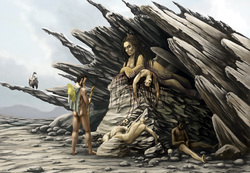 Key Terms & Facts- The Sphinx - A monster of Thebes, a woman's head and lions body, it asks riddles to determine the fate of a traveler or herself
- Oedipus - Solved the riddle, became king
Summary: The sphinx is this monster that is located in Thebes. It contains a woman's head, a lions body, and wings. It came to the city because King Lauis was killed and thought as being a protector. The sphinx would ask a riddle to a traveler and if they got it wrong she would kill them, if they got it wrong she would kill herself. Oedipus was the only one to solve the riddle and she killed herself.
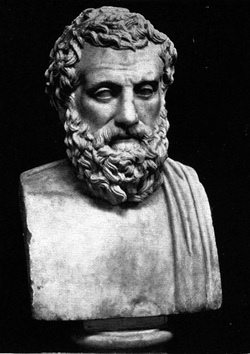 Key Terms & Facts- History(personal) - Born about 497/496 BC, At age 28 he won 1st place in plays, married with 1 son and 4 other children with mistress, elected twice as general, lived to see 90 died 406 BC
- Works - Wrote 123 plays only 7 survived, Oedipus the King, Antigone, Electra, Ajax, Oedipus at Colonus, Philocetes, and Maiden of Trachis
- Oedipus the King - Greatest work, tragedy of fate
- Antigone - Refuses to submit to authority, modern social dramatist
- Oedipus at Colonus - Known as the most tender poem, dramatic love tragedy
Summary: Sophocles wrote many plays but not a lot survived. He had countless numbers of first's in tragedies. He won many competitions for his work. His famous plays were Oedipus Rex, Antigone, Oedipus at Colonus, and etc. "No enemy is worse than bad advice," is a famous quote from Sophocles.
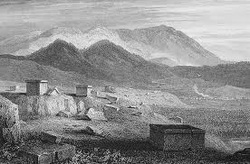 Key Terms & Facts- Thebes - Egyptian city founded by Cadmus
- Delphi - Most important religious sanctuaries dedicated to Apollo, thought to be the middle of the Earth
- Delos - Smallest of the Cydades islands, consider sacred to Apollo
- Helicon - Mountain and range of mountains, most fertile in Greece
- Pythian Temple - most important monuments of Gortys and religious center of the city prior to the establishment of Christianity
- Cythaeron Mountain - Where Oedipus was abandoned as an infant
Summary: There a three cities, two mountains, and a temple in this story. These are the place mentioned in Oedipus Rex. A lot of these locations are dedicated to Apollo. Cadmus was the founder of the big city of Thebes which is where the story takes place in. Cythaeron mountain was where Oedipus was abandoned as a infant.
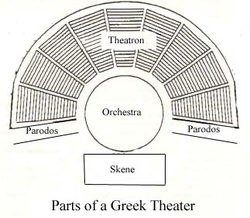 Key Terms & Facts- Dionysus - A patron of the theater and an agricultural/fertility god, theater invented for his honor, twice born (womb and thigh), Bacchus another name for Dionysus
- Start - No accurate date of the start of Greek theater, flourished between 550 BC-220 BC, tragedy and comedy
- Parts - Theater buildings called theatron, had 3 main elements: orchestra, skene, and audience
- Tragedy - A form of drama based on human suffering that invokes in its audience an accompanying catharsis or pleasure in viewing
- Aristotle vs. Tragedy - Aristotle argued that tragedy cleansed the heart through pity & terror
- Comedy - Any work generally intended to be humorous
- Anagnoris - A moment in a play or other work when a character makes a critical discovery
Summary: Greek theater originated from Diyonysus. He was born twice, in the womb and the thigh. Tragedy and comedy was the central idea for plays in Greek theater. The three main elements were: orchestra, skene, and audience. Tragedy cleansed the heart through pity and terror by Aristotle.
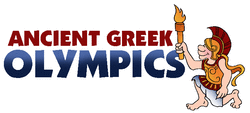 Key Terms & Facts- Greek Democracy - Huge influence on the government today (representative)
- Creativity - Greek literature, poems, drama
- Food - Olive oil, honey wheat, yogurt, and honey
- Olympics - 2012 Olympics at London
Summary: There are many reasons why Greek culture is still important today. Our whole democracy was developed by the representative economy the Greeks had. A lot of poems and dramas were created by Greek creativity. O live oil, honey, yogurt, etc are all tasty foods from Greece. Sports like the Olympics are also from Greek Culture in mythology.
 Key Terms & Facts- Cadmus - Founder of Thebes, Introduced alphabet
- Zeus - Supreme ruler of all olympics, Lord of the sky (bolt), Many kids (affairs), Wife of Hera
- Apollo - Son of Zeus, Music and son of truth
- Artemis - Goddess of virginity, moon, hunter of the gods
- Athena - Goddess of wisdom, wore armor, allowed to use Zeus's bolt
- Bacchus - Dionysus, red wine and se, only few who brought back the dead
- Sybil - Divine prophesies of the oracle (fortune-teller)
- Lycian Apollo - God of light and wolf killer
- Pan - God of shepherds and flocks
Summary: Many gods have different functions to perform. Zeus was the biggest god, basically the father. Cadmus was the founder of Thebes. He also introduced the alphabet. All were above mortals, and thought of themselves highly.
 Key Terms & Facts- Definition - Company of actors that comment by singing or speaking on an action occurring.
- Strophe - 1st section of the greek choral
- Anti Strophe - 2nd section sung from east to west, response to strophe
- Epode - A lyrical poem written in cuplets
Summary: The greek chorus is a company if actors that comment by singing or speaking all together about a part of the play. It is basically narrating and not taking sides. There is the strophe which is the 1st section of a greek choral. The 2nd section is the anti strophe and response to strophe. An epode is a lyrical poem written in cuplets.
 Blue book-pg.1209
-In Ancient Greek theaters the actors always wore over exaggerated masks so everyone could see them.
-it's hard to categorize plays
-1st perfect definitions and an airtight system of classification are impossible
-2nd it's quite unnecessary that we classify each play we read or see
-3rd be familiar with traditional tragedy and comedy because most write to conform to it
-4th comedy and tragedy are a great starting place
Tragedy:
-typical ending is death
-Aristotle wrote, is the imitation in dramatic form of an action that is serious and complete, with incidents arousing pity and fear wherewithal it effects catharsis of such emotions
-the plot involves a change in the protagonist fortune, in which he usually, but not always, falls from happiness to misery
-hamartia: a criminal act committed in ignorance of some material fact or even for the sake of a greater good
-Aristotle had important insights into nature of some of the greatest tragedies his conceptions are the basis for a kind of archetypal notion of tragedy that has dominated critical thought
- the protagonist is personally responsible for his downfall
Comedy:
-typical ending is marriage
|










 RSS Feed
RSS Feed